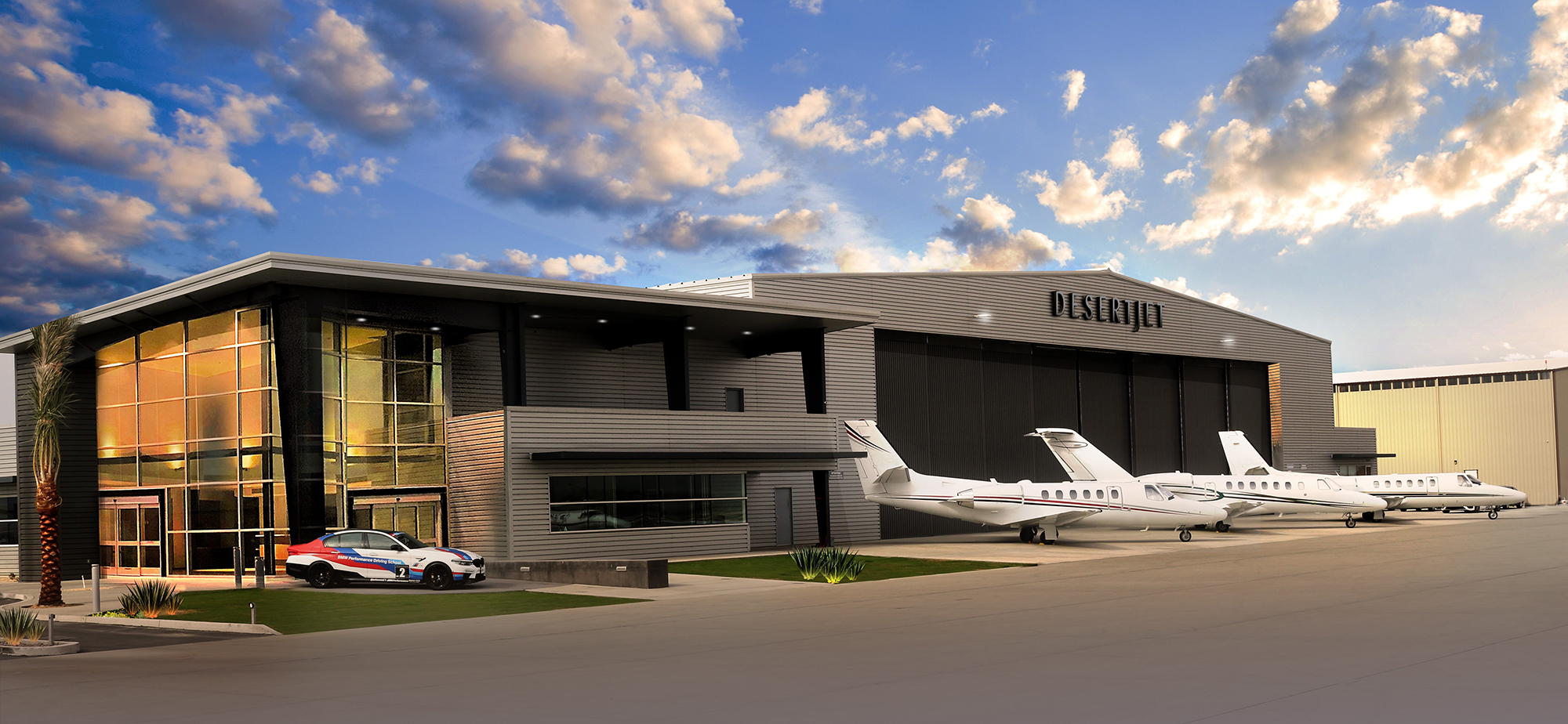In this new series, Thriving in Challenging Times, GPS Business Insider is highlighting local companies that have effectively managed their way through the past year under the most challenging conditions imaginable. While the year-over-year net loss of jobs in Greater Palm Springs is still estimated at more than 20,000 at this point, we are seeing some signs of recovery in several industry sectors and booming business in others. We also are learning about business success stories that are born from the perseverance, creativity and core values that have sustained them as they plan for growth in a world that strives for a return to normalcy.
On a perfectly clear, calm and warm February day last week perhaps the best sight I saw all day was the world-class 32,500-square-foot Desert Jet hangar and its tarmac full and bustling with private jets at Jacqueline Cochrane Regional Airport in Thermal. Not that it was frenetic in any way, not resembling the scene one might imagine at a busy commercial airport, instead the feel was calm and efficient but very active.
As a full-service aviation management company, Desert Jet is a fixed base operator (FBO) that offers ground handling, jet fuel and hangar storage along with the only locally owned FAA-Certified Repair Station that provides a wide range of scheduled and unscheduled maintenance support for a wide range of jet aircraft. In addition to the typical FBO services, Desert Jet provides its clients with expertise in acquiring, operating and generating revenue using private jet aircraft, and offers on-demand charters through its own fleet of jet aircraft.
Ownership Changes at a Challenging Time
In August 2018, Jim McCool – who utilized Desert Jet’s services as an aircraft owner/pilot for the first time in 2017 – joined the company as a minority owner and then bought the entire company in May 2020.
“In 2017, while living in the San Francisco Bay Area I upgraded to a more sophisticated turbo prop plane and used it for my flights to the desert, so I wanted to consider some other potential service operations,” said McCool. “I did some checking on Desert Jet and then my wife and I flew in unannounced. From a pilot’s perspective, when I arrived at Desert Jet, they made me feel like I was flying Air Force One the way I was greeted. My wife and I had flown into many FBOs around the country and we’ve seen many differences in the services among them, but none matched the uniqueness of Desert Jet, like meeting unanticipated needs, doing things out of the ordinary and ultimately creating a great experience.”
McCool said that he always had an interest in getting involved in aviation business opportunities, so he asked, “Who owns this place?” Soon after, he got a call from the venerable owner at the time, Denise Wilson. “I was very impressed with Denise and we had a great conversation. She was at that time working on the vision that built this place. She agreed to take me on as a partner in August of 2018.”
Then late in 2019, Denise wanted to go in a different direction personally, so McCool acquired full ownership of the business in May 2020.
“My vision was to take that spark of the phenomenal experience I had here, coupled with my living in the desert and watching what was going on in this part of the Valley, coupled with my aviation interests and matched with my background in financial services and leadership at a senior level at Charles Schwab,” said McCool. “I saw this as a grand opportunity to write the next chapter of my life. As they say, (Baby) Boomers never retire and I’m probably an example of that.”
Demand by Individuals Soars After a Tough Spring
Immediately following the onset of the pandemic in March last year it was very difficult for the company. Nobody was traveling except those who rushed out of the region to get back to their primary residences.
“We were in the final planning process for the series of major events that were coming, from the BNP Paribas tennis tournament to the music festivals,” said Desert Jet CEO, Jared Fox. “It was all about to happen and then it came to a screeching halt. We had to make some quick decisions and were able to take care of our team and get through the summer okay. Of course, conducting the business and the flights became much more difficult to do because of the safety protocols and concerns but we were able to safely fly and now we’re roughly where we were a year ago from a performance perspective. I’d say that in the middle of a pandemic, that’s a bit of a victory.
Similar to the local golf and residential real estate industries that are booming, Desert Jet is now seeing substantial growth in certain segments of its client base while weathering the challenges of low demand in others. More specifically, the growth for Desert Jet is coming primarily from increased demand by individuals and families, including people who maybe had considered private aviation in the past but never tried it who are seeing it as a much safer and more efficient way to get to the places they still need to go.
Private jets allow consumers to travel with minimal interaction with other people on the flight and at the airport. A recent aviation industry study showed that a passenger on a commercial flight, with check-in security and boarding, will encounter 700 points of contact on every flight, while a customer on a private jet will only go through 20 touchpoints. As a result, private jet companies are seeing this translate into a strong increase in demand.
“What has been very interesting is that it has been a significant change in who it is that we’re serving,” said Fox. “Business travel for meetings, groups out on road shows, people flying in for special events; that is not around at all now. Fortunately, many new people have taken the opportunity during the pandemic to experience private aviation and they fell in love with it or, at a minimum, they’ve realized how efficient and convenient it is. It’s a very sticky product and demand has increased significantly.”
As one example, national leading private jet membership company, NetJets, said in published news reports that last year it saw increasing interest, with June its “largest month ever for new owner relationships,” and that between January and October 2020 they encountered three times as many new customers as the same period in 2019.
VistaJet, which also charters private jets through a membership program, says that July 2020 saw a 320% increase in new memberships, compared to July 2019. They also said that, as of June 2020, 71% of incoming requests were from passengers who were new to using private jets regularly.
McCool said, “As a two-million-mile flyer with the major carriers during my career, I can say that the experience of flying first class is nowhere near what it used to be. There’s a segment of people out there who historically have always flown first class and are asking why they would pay for first class to get so much less than they used to in terms of service and experience. More and more people are discovering that even though the costs may be higher, they’re putting a higher value on the time and experience.”
For Desert Jet, “a good percentage of our clientele are homeowners who are seasonal residents,” said Fox. “Some have offices in their second homes so they can work while here and move back and forth between homes throughout the season. In addition, we’re seeing a lot of vacationers coming in to play golf, utilize the Thermal Club racetrack and enjoy the other outdoor activities the desert has to offer.”
McCool points to other ways the company has generated increased demand for their services. “Looking at some of the big operators in our industry we know that demand is outstripping supply, and we’ve been a direct beneficiary of that because we’ve built relationships with those kinds of operators. When they need supplemental lift to take care of their growing base of clients, they’re using Desert Jet. As they’ve seen us build this state-of-the-art facility, experienced our management team in operation, know the reputation we’ve built, along with the high ratings we get, we’re becoming a new choice for them. That wasn’t the case a year ago, so it has been a big positive for us.”
Yet another growing customer segment for the company is jet owners that typically have a low utilization of their asset and can benefit from having Desert Jet sell time on it to others. “For people who may fly their jet 100 to 200 hours a year it’s a very expensive proposition,” says McCool. “Because of demand generated for flights, we can add another 400 to 500 hours a year on top of that. In doing so we cover crewing and maintenance and can help the owner realize a significant expense reduction by utilizing the unused capacity inherent in the ownership of private jets. We have been spending a lot of time growing this segment of our business.”
Long-Term Vision and Management Expertise Lift Desert Jet
An important issue now for Desert Jet and the entire private aviation sector is whether the new client business can be sustained in the years to come as the vaccines roll out and we return to a more normal lifestyle while the business aviation part of the industry comes back at some level. “The question will be if the total addressable market raises as a whole which we are hopeful for and believe it will,” says Fox.
“I think about how people have been confined to their homes for so long and unable to socialize and not able to travel much and do the things they want to do,” says McCool. “There’s going to be a pronounced change when people are going to be able to re-connect with their friends and family and get out. We already know that they want to travel again as soon as possible.”
Despite the advantages of private aviation, a recent report by McKinsey & Company noted that prior to the pandemic, only 10% of those who could afford to fly privately were doing so. Clearly, that percentage has been increasing as concerns about COVID-19 and the desire to travel again are leading more people to seek additional options. For Desert Jet and others in the sector, the McKinsey study should be reason for optimism based on the untapped potential.
“Yes, it is expensive but there are people who realize that they’re getting such a wonderful and safer experience,” said McCool. “That’s what we’re selling.”
Fox added, “When you look at the efficiency from a time perspective, the amount of time saved is very substantial. It’s one of the biggest benefits of what we provide. We literally sell time machines.”
McCool actually is concerned that future demand for private aviation might outstrip Desert Jet’s capacity. “It’s an interesting challenge we’ll have to figure out,” he said.
The Bigger Picture According to Jim McCool
“This whole business here is not a sprint, it’s a journey for us,” said McCool. “The bigger picture for me is based on what my parents taught me which is to leave the room better than it was when you came into it. When I think about what’s going on in the Valley, I think about the ag worker families, the change of demographics, the cost of college and so many not even having access to it at all. There are numerous stories of employees building well-paying careers at our company that just light me up in a positive way.”
In just one of many examples among Desert Jet’s 47 employees, the son of an agriculture worker that started off at the entry level has worked extremely hard for many years and now is in a high-level management job with a six-figure salary. “So, when I think of the impact we can have, it’s much bigger than Desert Jet,” said McCool.
“It’s this area around us that is such an opportunity,” added McCool. “As this airport grows and we get a U.S. Customs Office and perhaps a bigger terminal facility and maybe a control tower as well. That’s all additive for this whole side of the valley. When I think about the many other things that will spring up over time, and it won’t happen overnight, those things excite me. It’s really about extending the dividend to the greater community as a whole.”




